When it comes to creating content for your business, you have likely heard the terms “content writing” and “copywriting” thrown around. At this point, you’re probably wondering…
Which one do I need for my website and marketing?
Should I hire a content writer or a copywriter?
Although both types of content creation are important, they serve different purposes and require different skills. And that’s what this article addresses.
Of course, like most content marketing strategy, the ultimate mission of both types of writing is to improve conversion rates. However, they don’t approach this mission in the same way.
And, as a business owner or marketer, you need to understand when to use content writing vs copywriting in your marketing and content creation.
What is Content Writing?
Content writing is the creation of informative and engaging content that provides insights to a target audience. For example, a how-to guide or a blog post that offers helpful tips educate your prospect and show off your expertise.
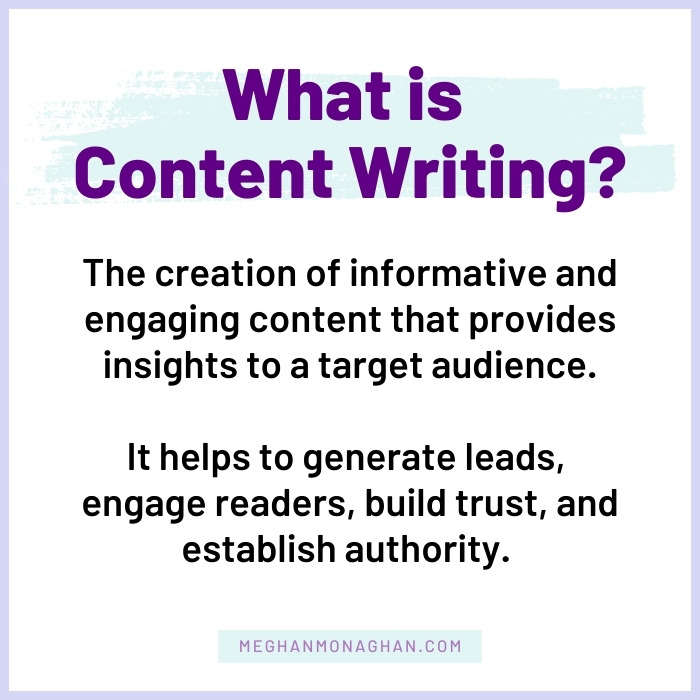
Although content writing focuses on delivering value to potential customers, it is also meant to attract leads and sometimes to help websites rank higher in search engines.
Examples of content writing include:
- blog posts
- articles
- white papers
- eBooks and
- case studies.
Content writing is often considered a part of content marketing as well as a tactic used in search engine optimization (SEO) to attract more visitors to a website.
When to Use Content Writing In Your Business
Not sure how to apply content writing to your business and marketing? Since content writing informs and educates, it positions your brand as a trustworthy and experienced resource to prospects who are searching for answers and solutions to their challenges.
Some of the best ways to use content writing are when you want to:
1) Establish Authority and Trust
Content writing is ideal if you want to establish yourself or your brand as an authority figure in an industry.
When you publish high-quality, authority content consistently, you build your reputation, credibility, and brand awareness by offering unique perspectives on industry trends, challenges, and solutions. Through this type of “clout content,” you’ll become recognized as an expert within your niche.
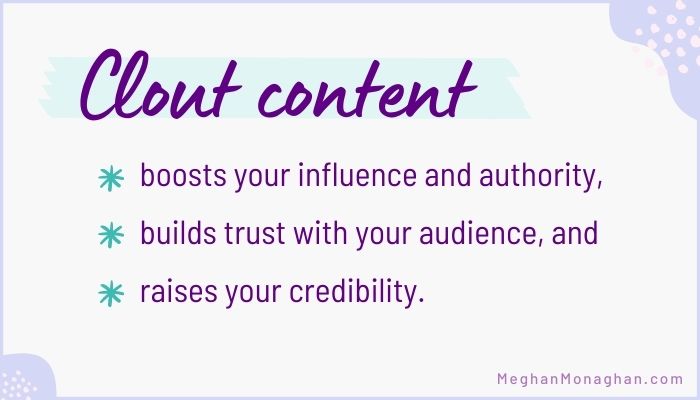
Since this content also provides valuable information, you’ll build trust with your audience. Educational content positions you as an authority, which can help to attract new leads while converting more leads into buyers.
Consistent, authoritative, custom content establishes you and your business as a leader in your field. This distinction can benefit your brand by differentiating you from the competition.
2) Improve Search Engine Optimization and Increase Website Visitors
Need help improving your ranking in search engines? When created with SEO in mind, content writing can drive organic traffic to your website.
Search engines use your website content to understand what your business is about and determine your authority in certain subject areas. Since there is so much content online, Google (the most used search engine) uses your content to gauge your experience, expertise, authority, and trustworthiness (E-E-A-T).
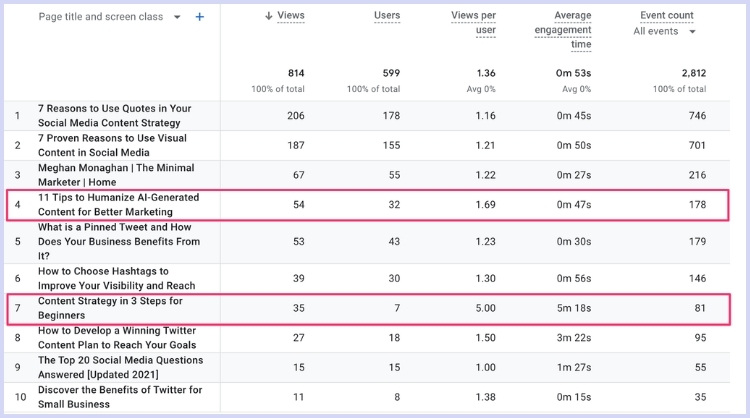
So, content writing can be an important function of SEO. Of course, you’ll need a writer who is experienced with SEO. Not all content writers have this skill or expertise!
High-quality, search-optimized website content that targets popular topics attracts more visitors to your site. It can boost where your site appears in search engines–without relying on paid advertising.
Take a look at my own results:
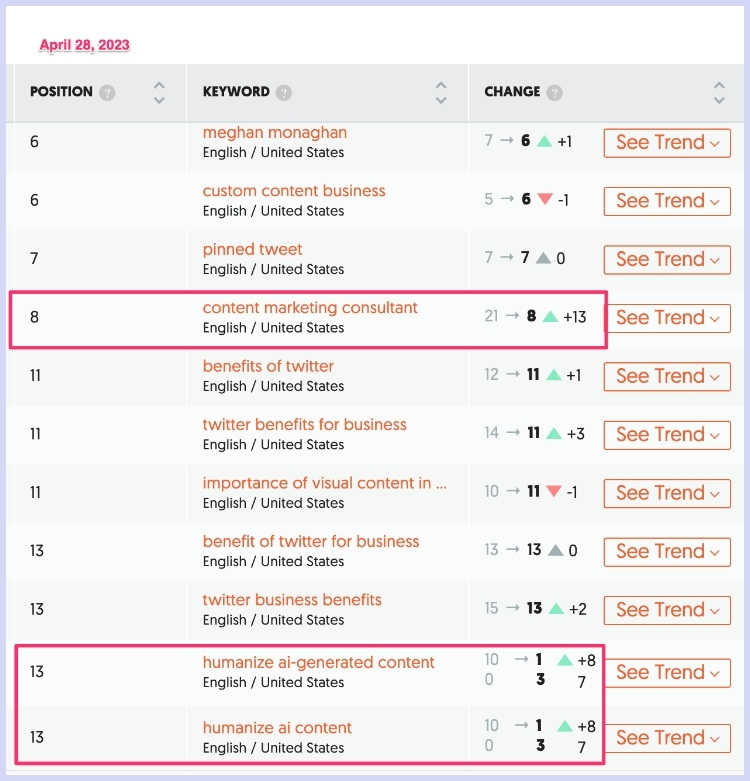
This type of optimized content requires experience with SEO best practices, such as an intermediate proficiency in and and an understanding of:
- search intent and key phrases
- E-E-A-T
- page/content formatting and structure
- internal linking and content strategy
- page optimization (title tags, headings, META descriptions, URL structure, etc.)
- and more!
3) Generate Leads
Content writing also generates leads. Engaging content that addresses the needs of potential customers can encourage them to sign up for an email list. They may even request further information about your products or services, ultimately leading to increased sales opportunities.
By strategically creating content that appeals to different buyers, you will attract people who are at different stages of awareness. In other words, different content topics appeal to different types of leads. So, content writing can help you attract more qualified leads.

For instance, a case study outlining how your service improved your client’s business is better for generating a hot lead who is closer to making a buying decision (aka bottom of the funnel).
On the other hand, a blog post that educates beginners on industry terms and best practices may pique the interest of less informed prospects (aka top of the funnel).
This shows how you can use your content writing to attract more targeted leads into your sales funnel. Combine that tactic with a solid SEO content strategy, and you’ll be getting better quality leads to your website. And better leads means more sales.
In general, content writing is a big part of content marketing for small businesses!
4) Build Assets
Did you know that when you invest in content writing that you are also creating a valuable asset for your business?
Blog posts can be turned into other formats, such as video and audio scripts, social media posts, and emails. In fact, much of your blog and website content can be repurposed and turned into other formats, such as webinars or eBooks, to use for marketing. These could even be turned into paid offers!

By the way, content writing can extend beyond blog posts and repurposing. To give you an example, I am a content writer, and I’ve created lots of pieces of content for clients:
- online courses
- digital products
- challenges
- live workshops
- workbooks
- presentations
- webinars
- eBooks
- video scripts (vlogs)
- audio scripts (podcasts)
All of this content is assets that increase your business value since they can be used for more than marketing and turned into paid products!
Additionally, a website with fantastic content and great SEO can be turned into a money maker by selling digital products or affiliate offers. Or, you could even sell your site to make a profit!
At this point, you may be asking…what’s content writing not good for? Because it seems like this type of content is versatile and provides many opportunities to boost your business!
But, content writing falls short when it comes to convincing people to take action. It’s more about information and education and less about persuasive tactics. That’s where copywriting comes into the picture.
What is Copywriting?
Copywriting is writing engaging text with the ultimate goal of selling or promoting something. This type of writing focuses on persuading potential customers to take a particular action, such as:
- opting into a webinar,
- downloading a cheat sheet,
- subscribing to an email list, or
- buying something.
Copywriting plays a key role in marketing and advertising by conveying the benefits of goods or services.
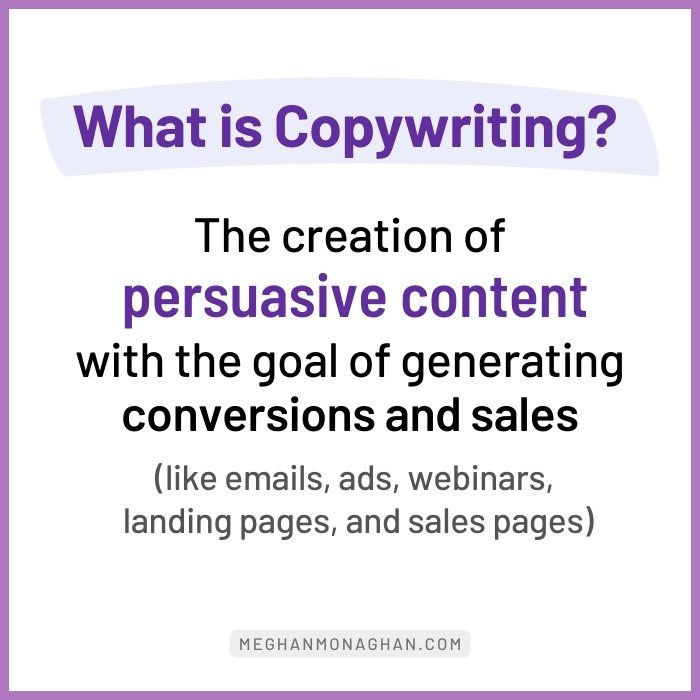
Examples of copywriting are:
- Sales copy / sales pages / sales letters
- Landing pages / opt-in pages
- Website pop-ups
- Advertising
- Email campaigns and sales emails
- Product descriptions
When to Use Copywriting in Your Business
Copywriting is best when you want to persuade your prospects to take a specific action, such as clicking a button, watching a video, and making a purchase.
The goal with copywriting is to craft compelling messages that:
- resonate with your prospects’ emotions and intellect and
- convince them to take the next step (whatever that may be).
With that in mind, you would use copywriting to:
1) Promote an Offer
Whether you’re giving away a freebie or selling something, copywriting is up to the task. Persuasive copy is meant to convert a looky-lou into a lead or a customer.

By design, copywriting uses psychology to pique interest, create a reaction, and drive a person to take action. As such, it is superb for advertising and promotion.
So, when you’ve got an ad, sales page, or opt-in page that is promoting something, use copywriting.
2) Increase Your Conversions
Informational, educational, and entertaining content have value, but when you want to increase your conversions, copywriting reigns supreme.
To convince a person on the fence to get off the fence requires art and skill in psychology, storytelling, and writing. You need to change their perspective. That means understanding your target market’s needs, wants, fears, and objections.
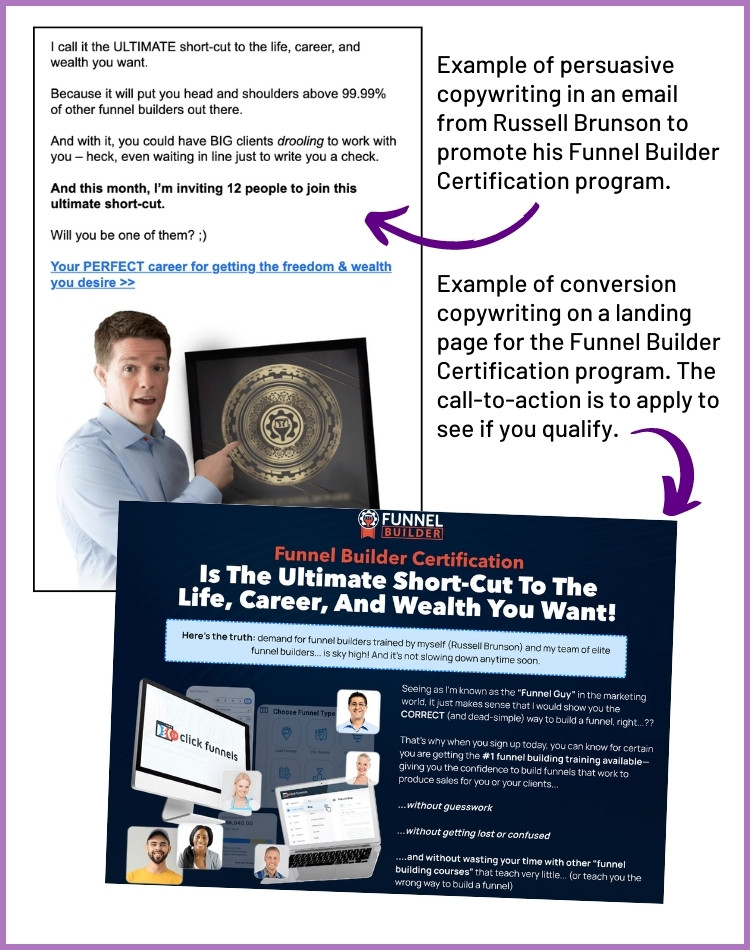
Taking a person through a journey so that they will finally say “yes!” to you is not easy most of the time. And, the bigger the commitment, the tougher the “yes” is.
For instance, it’s easier to get someone to sign up for your email list than to purchase an online course for $997. High-quality copy plays a crucial role in convincing visitors about the value they’ll get from agreeing to your offer, free or paid.
People buy based on their emotions and they back up their decisions with logic. So, you need to check all of the emotional and intellectual boxes in your marketing.
For this reason, don’t send a content writer to do a copywriter’s job! Copywriters are skilled in the art of persuasion and will convert more maybes into yeses than other types of writers.
Check out these landing page examples from Unbounce to see conversion copywriting in action.
3) Engage an Audience
From irresistible headlines and subject lines to tempting body copy, copywriters are the best at engaging an audience. It’s what they do!
That’s because copywriting is designed to seduce, entice, and captivate. It’s meant to catch your attention, stop the scroll, and elicit a response.
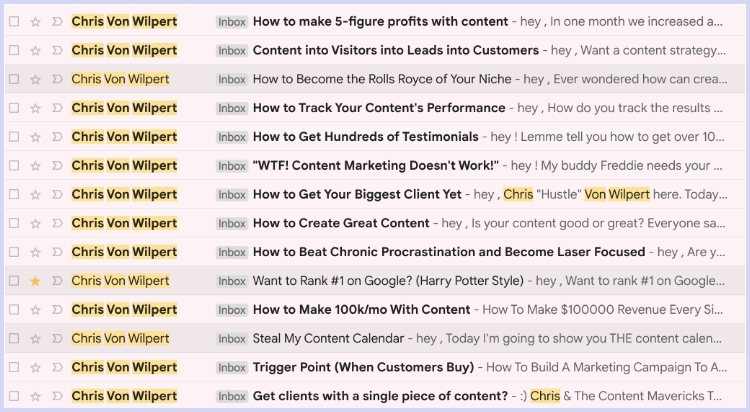
For example, email campaigns with catchy subject lines and engaging body text are often used to catch attention and engage. HubSpot reports that 33% of users choose to open emails because of catchy subject lines.
After you’ve captured a lead, an email nurturing sequence can help move them through your sales funnel. Effective copywriting ensures that these emails are engaging and persuasive enough to keep leads interested in what you have to offer.
The beguiling messages of copywriting have likely persuaded you to participate or buy at times when you weren’t sure you wanted to do either! 🙂
Anytime you’re focused on driving conversions and sales, then copywriting is the way to go.
However, it’s important to note that content writing and copywriting work together in a comprehensive marketing strategy.
What is the Difference Between Content Writing and Copywriting?
The biggest difference between content writing and copywriting is that they serve different purposes and goals.
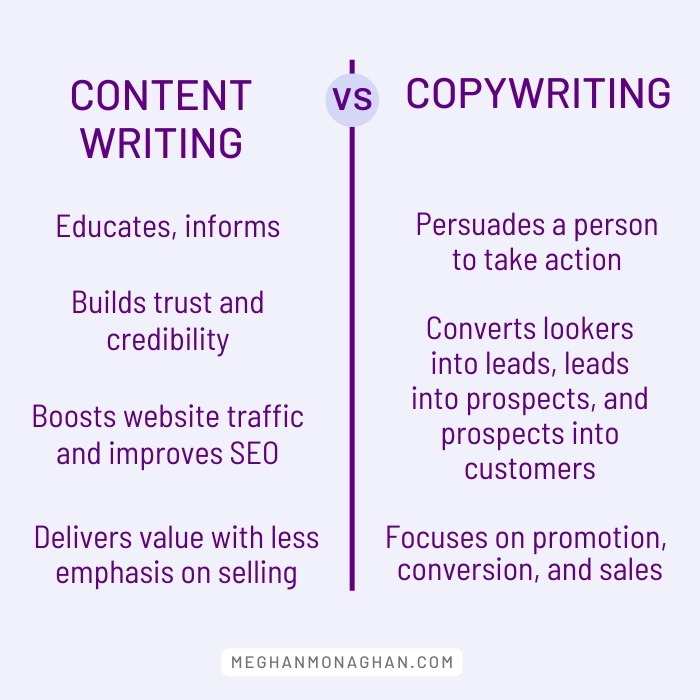
The purpose of content writing is to inform, educate, or entertain people by providing valuable information related to a specific topic or industry. And, the primary goal of content writing is to build trust and credibility for your brand while taking people through the customer journey. Secondarily, content writing is a main tactic in SEO.
On the other hand, the purpose of copywriting is to persuade a person to take a specific action, such as make a purchase or sign up for a webinar. The main objective is conversion with the ultimate goal of turning prospects into customers.
I think of it as “content versus copy.” Content delivers value and educates. Copy drives action and promotes.
They are also different when it comes to tone or writing style.
The tone used in content writing matches its purpose and goal. It tends to be more conversational and approachable since it’s meant to educate rather than sell. This writing style is more like a helpful guide or wise sage. It’s not about selling. The writing builds trust, showcases your brand’s personality, and provides insights.
Copywriting, however, employs a more influential, persuasive tone to encourage the reader to take action. This often involves using convincing examples, emotional triggers, and compelling storytelling techniques to capture attention and drive conversions. Copywriters understand human psychology to craft messages that effectively convince people to do something.
Do You Need a Content Writer or a Copywriter for Your Business?
When it’s time to create content, who will you hire to help with your writing needs? A content writer or a copywriter?
The truth is that you’ll likely need BOTH types of writers in your business. That’s because there are times when you need CONTENT to educate or inform and times when you need COPY to promote.
So, consider your goals before you hire a writer.

If you’re looking to educate and inform your audience, a content writer may be the best fit. They create blog posts, articles, and other long-form content.
Some content or freelance writers branch out into other areas of content development to create other digital assets, such as online courses, presentations, case studies, white papers, and webinars. And, an SEO content writer specializes in website content that is optimized to rank in search engines.
On the other hand, if you’re looking to drive conversions and sales, a copywriter may be the better choice. They specialize in persuasive copy for your website, email campaigns, and other marketing materials that encourage your audience to take action.
Can a content writer write copy? Is a copywriter good at content writing? Some writers may be adept at both content writing and copywriting. But don’t assume all writers are effective at both.
Different types of writing require different skill sets. For example, content writing often requires SEO expertise and copywriting benefits from an understanding of psychology. And, both can benefit from experience in marketing!
Identify your business goals and content needs first, then seek the appropriate writer.
Guess What? You Need Both Content Writing and Copywriting to Succeed in Business
In business, there are times when you need to serve your audience as a trainer or guide. Other times, you need to promote something and convince people to take action. And that means, at some point, your business will require both types of writing!
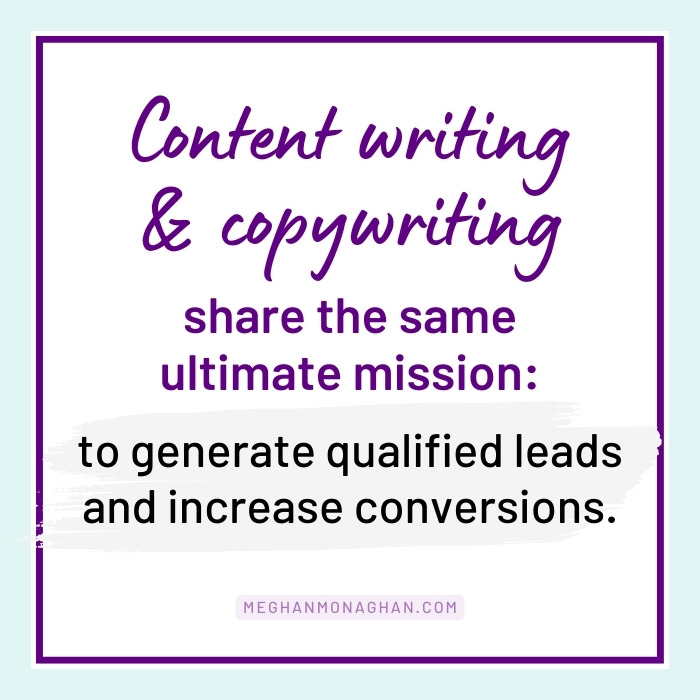
So, let your business and content goals determine whether you need content writing or copywriting. Although they differ in purpose and goals, both types of writing exist for the same ultimate mission: to help generate qualified leads and increase your conversions.
Whether you tackle creating content or copy for yourself or hire a professional, you now have a better idea which you need and when.
Now, go forth and conquer your marketing!
FAQs
What is the difference between content writing and copywriting?
The main difference between content writing and copywriting is the purpose and goals of each. Content writing educates and provides value to engage with an audience while building trust and credibility for a brand. Copywriting persuades a person to take a specific action, such as make a purchase or sign up for a webinar, and is more focused on conversion and sales.
Which one is better for SEO: content writing or copywriting?
Content writing is better for SEO than copywriting. Copywriting is created to persuade and drive action. On the other hand, content writing informs and delivers value, which is a common goal of search engines like Google. Because search engines want to answer questions and provide a quality experience for users, they favor high-quality website content, which is what content writing offers.
Can a content writer also be a copywriter?
Yes, a content writer can also be a copywriter. The two roles differ in their goals and skills, but some writers are adept at functioning as both a content writer and copywriter. Both roles need to have excellent writing skills, a good understanding of a target audience, and the ability to create engaging content. However, copywriters often focus more on creating persuasive content that drives sales or conversions, while content writers may be more focused on informing or educating an audience. Ultimately, whether a writer can excel in both roles will depend on their individual strengths and interests.
Which one is more important for a business: content writing or copywriting?
Both content writing and copywriting are important for a business, but they serve different purposes. Content writing focuses on creating informative and engaging content that provides value to the reader and helps establish the business as an authority in its industry. This type of writing is typically used for blog posts, white papers, and other long-form content that can also improve SEO. On the other hand, copywriting is focused on persuasive writing that encourages the reader to take a specific action, such as making a purchase or signing up for a newsletter. This type of writing is typically used for advertisements, product descriptions, and landing pages. Ultimately, both content writing and copywriting are essential for a successful business since they work together to attract prospects and turn them into buyers.
